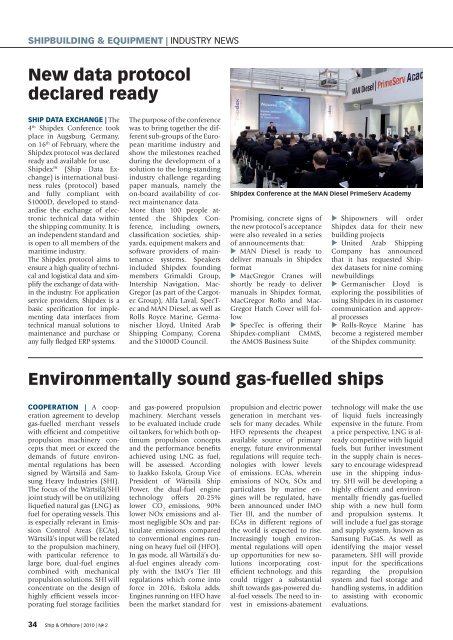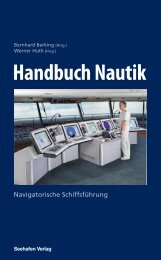| 2 | 2010 - Schiff & Hafen
| 2 | 2010 - Schiff & Hafen
| 2 | 2010 - Schiff & Hafen
Create successful ePaper yourself
Turn your PDF publications into a flip-book with our unique Google optimized e-Paper software.
SHIPBUILDING & EQUIPMENT | INDUSTRY NEWS<br />
New data protocol<br />
declared ready<br />
SHIP DATA EXCHANGE | The<br />
4 th Shipdex Conference took<br />
place in Augsburg, Germany,<br />
on 16 th of February, where the<br />
Shipdex protocol was declared<br />
ready and available for use.<br />
Shipdex (Ship Data Exchange)<br />
is international business<br />
rules (protocol) based<br />
and fully compliant with<br />
S1000D, developed to standardise<br />
the exchange of electronic<br />
technical data within<br />
the shipping community. It is<br />
an independent standard and<br />
is open to all members of the<br />
maritime industry.<br />
The Shipdex protocol aims to<br />
ensure a high quality of technical<br />
and logistical data and simplify<br />
the exchange of data within<br />
the industry. For application<br />
service providers, Shipdex is a<br />
basic specifi cation for implementing<br />
data interfaces from<br />
technical manual solutions to<br />
maintenance and purchase or<br />
any fully fl edged ERP systems.<br />
The purpose of the conference<br />
was to bring together the different<br />
sub-groups of the European<br />
maritime industry and<br />
show the milestones reached<br />
during the development of a<br />
solution to the long-standing<br />
industry challenge regarding<br />
paper manuals, namely the<br />
on-board availability of correct<br />
maintenance data.<br />
More than 100 people attented<br />
the Shipdex Conference,<br />
including owners,<br />
classifi cation societies, shipyards,<br />
equipment makers and<br />
software providers of maintenance<br />
systems. Speakers<br />
included Shipdex founding<br />
members Grimaldi Group,<br />
Intership Navigation, Mac-<br />
Gregor (as part of the Cargotec<br />
Group), Alfa Laval, SpecTec<br />
and MAN Diesel, as well as<br />
Rolls Royce Marine, Germanischer<br />
Lloyd, United Arab<br />
Shipping Company, Corena<br />
and the S1000D Council.<br />
Shipdex Conference at the MAN Diesel PrimeServ Academy<br />
Promising, concrete signs of<br />
the new protocol’s acceptance<br />
were also revealed in a series<br />
of announcements that:<br />
� MAN Diesel is ready to<br />
deliver manuals in Shipdex<br />
format<br />
�<br />
MacGregor Cranes will<br />
shortly be ready to deliver<br />
manuals in Shipdex format,<br />
MacGregor RoRo and Mac-<br />
Gregor Hatch Cover will follow<br />
�<br />
SpecTec is offering their<br />
Shipdex-compliant CMMS,<br />
the AMOS Business Suite<br />
� Shipowners will order<br />
Shipdex data for their new<br />
building projects<br />
� United Arab Shipping<br />
Company has announced<br />
that it has requested Shipdex<br />
datasets for nine coming<br />
newbuildings<br />
� Germanischer Lloyd is<br />
exploring the possibilities of<br />
using Shipdex in its customer<br />
communication and approval<br />
processes<br />
� Rolls-Royce Marine has<br />
become a registered member<br />
of the Shipdex community.<br />
Environmentally sound gas-fuelled ships<br />
COOPERATION | A cooperation<br />
agreement to develop<br />
gas-fuelled merchant vessels<br />
with effi cient and competitive<br />
propulsion machinery concepts<br />
that meet or exceed the<br />
demands of future environmental<br />
regulations has been<br />
signed by Wärtsilä and Samsung<br />
Heavy Industries (SHI).<br />
The focus of the Wärtsilä/SHI<br />
joint study will be on utilizing<br />
liquefi ed natural gas (LNG) as<br />
fuel for operating vessels. This<br />
is especially relevant in Emission<br />
Control Areas (ECAs).<br />
Wärtsilä’s input will be related<br />
to the propulsion machinery,<br />
with particular reference to<br />
large bore, dual-fuel engines<br />
combined with mechanical<br />
propulsion solutions. SHI will<br />
concentrate on the design of<br />
highly effi cient vessels incorporating<br />
fuel storage facilities<br />
34 Ship & Offshore | <strong>2010</strong> | N o 2<br />
and gas-powered propulsion<br />
machinery. Merchant vessels<br />
to be evaluated include crude<br />
oil tankers, for which both optimum<br />
propulsion concepts<br />
and the performance benefi ts<br />
achieved using LNG as fuel,<br />
will be assessed. According<br />
to Jaakko Eskola, Group Vice<br />
President of Wärtsilä Ship<br />
Power, the dual-fuel engine<br />
technology offers 20-25%<br />
lower CO 2 emissions, 90%<br />
lower NOx emissions and almost<br />
negligible SOx and particulate<br />
emissions compared<br />
to conventional engines running<br />
on heavy fuel oil (HFO).<br />
In gas mode, all Wärtsilä’s dual-fuel<br />
engines already comply<br />
with the IMO’s Tier III<br />
regulations which come into<br />
force in 2016, Eskola adds.<br />
Engines running on HFO have<br />
been the market standard for<br />
propulsion and electric power<br />
generation in merchant vessels<br />
for many decades. While<br />
HFO represents the cheapest<br />
available source of primary<br />
energy, future environmental<br />
regulations will require technologies<br />
with lower levels<br />
of emissions. ECAs, wherein<br />
emissions of NOx, SOx and<br />
particulates by marine engines<br />
will be regulated, have<br />
been announced under IMO<br />
Tier III, and the number of<br />
ECAs in different regions of<br />
the world is expected to rise.<br />
Increasingly tough environmental<br />
regulations will open<br />
up opportunities for new solutions<br />
incorporating costeffi<br />
cient technology, and this<br />
could trigger a substantial<br />
shift towards gas-powered dual-fuel<br />
vessels. The need to invest<br />
in emissions-abatement<br />
technology will make the use<br />
of liquid fuels increasingly<br />
expensive in the future. From<br />
a price perspective, LNG is already<br />
competitive with liquid<br />
fuels, but further investment<br />
in the supply chain is necessary<br />
to encourage widespread<br />
use in the shipping industry.<br />
SHI will be developing a<br />
highly effi cient and environmentally<br />
friendly gas-fuelled<br />
ship with a new hull form<br />
and propulsion systems. It<br />
will include a fuel gas storage<br />
and supply system, known as<br />
Samsung FuGaS. As well as<br />
identifying the major vessel<br />
parameters, SHI will provide<br />
input for the specifi cations<br />
regarding the propulsion<br />
system and fuel storage and<br />
handling systems, in addition<br />
to assisting with economic<br />
evaluations.



